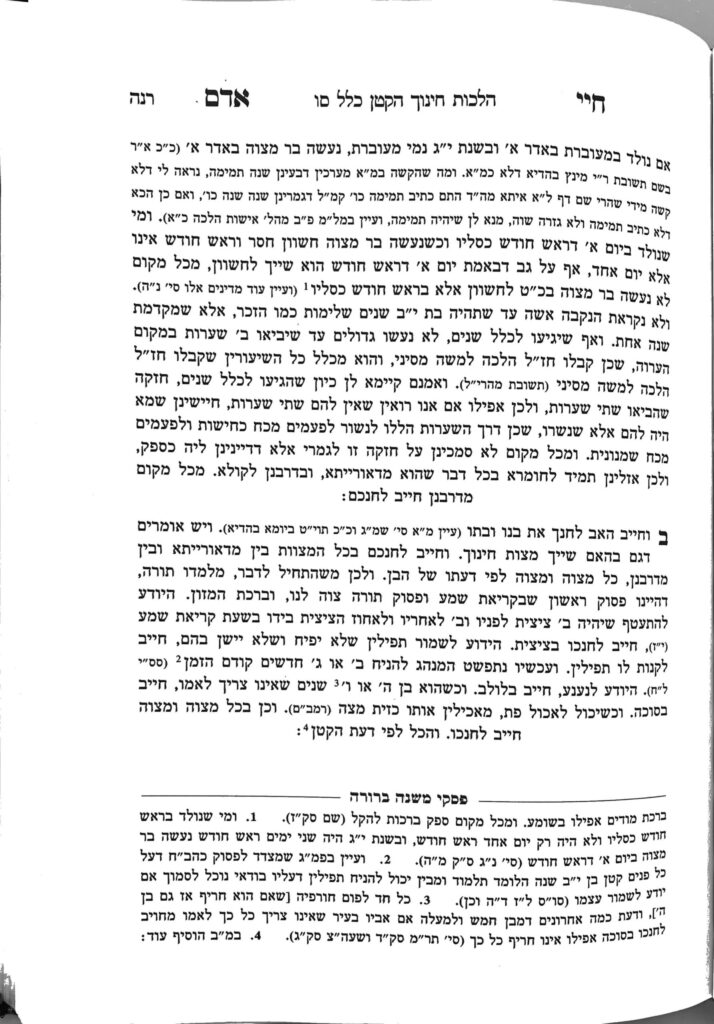We have finished siman 2, in which the Chayei Adam listed some examples of the proper age to begin chinuch in specific mitzvos. The Chayei Adam wrote that the correct time for a child to begin shaking lulav is when he is able to follow the procedures of na’a’nuim and kiskus. Yesterday, we learned that, lechatchilla, the katan should have their own lulav, in order to perform the na’a’nuim during hallel with the rest of the tzibbur. If they do not have their own lulav, an adult cannot give them their own as a matanah al menas lechachzir, because the katan does not have the halachic capacity to relinquish ownership. Today, we will discuss whether the katan borrowing a lulav will fulfill the mitzvah of chinuch or not.
The Mishnah Berurah, in siman 658:sk 28, brings a machlokes whether a katan can borrow a lulav for chinuch purposes or not. The first opinion is that a katan is not yotzei, and the one doing so has not fulfilled the mitzvah of chinuch. It should be noted, according to this opinion, one may have no choice, in order for they or other adults to do their mitzvah deoraysa (on the first two days). Even on subsequent days, when lulav is a mitzvah derabanan, if a conflict would occur, their mitzvah of lulav precedes the mitzvah of chinuch.
The second opinion is that a katan would fulfil his mitzvah. This is the opinion of the Mordechai, in the name of the Raavan. The Shaar Hatziyun explains that this opinion understands that the primary requirement regarding chinuch is that the intrinsic, defining elements of the mitzvah be performed properly, but ancillary issues, such as ownership of the item, are not meakeiv.
Rav Moshe, in a teshuva, suggests that the machlokes between these opinions is whether the mitzvah of chinuch is to train the child to perform the mitzvah properly as an adult, in which case something ancillary such as ownership does not inhibit proper performance of the mitzvah; or maybe Chazal created a new chiyuv on the child to do the mitzvah, in which case all elements of the mitzvah must be performed correctly in order for the child to fulfil his mitzvah of chinuch. According to the first understanding, the father is simply helping the child practice for adulthood; according to the second, the child is fulfilling his own mitzvah,. The assumption of the poskim is that the Mishnah Berurah seems comfortable with the second opinion. Thus, regarding lulav, a child could be yotzei with a borrowed lulav.
Regarding the issue of a katan acquiring but not being able to relinquish ownership, an interesting side issue can occur regarding childrens’ aravos businesses, where they cut aravos for Hoshanah Rabbah and sell them at a small profit. Although, mideoraysa, they are unable to relinquish ownership, miderabanan they are, and since the mitzvah of hoshanos is derabanan, there is no issue of lochem, and one may buy from them. Additionally, one could use those aravos for their lulav on chol hamoed, where the mitzvah of lulav is derabanan (other than in the Beis Hamikdash). However, one should avoid purchasing aravos from a katan for use on the first day (or two days, in chutz la’aretz) of yom tov.
It is important to point out that even if a katan can not do na’a’nuim properly with all the kiskusim, if he can approximate na’a’nuim by shaking the lulav in the proper directions, the Mishnah Berurah writes (657:sk 2) that it is sufficient
Summary
Regarding the chiyuv chinuch for the mitzvah of lulav, it is preferable, lechatchilla, that the katan have their own lulav, in order to perform the na’a’nuim during hallel with the rest of the tzibbur. Alternatively, a katan may borrow a lulav from an adult, and fulfil their mitzvah in that manner.
Chinuch requires that the child do the mitzvah properly, but only in regards to defining elements of the mitzvah. Other details may not be necessary to fulfill chinuch.



